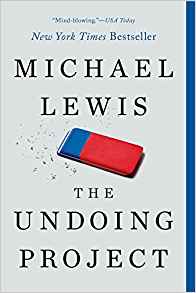 Michael Lewis, The Undoing Project: A Friendship That Changed Our Minds (New York: W. W. Norton, 2017), 368pp.
Michael Lewis, The Undoing Project: A Friendship That Changed Our Minds (New York: W. W. Norton, 2017), 368pp.
A book review by Brad Keister.
This book is a biography of the intertwined lives of Daniel Kahneman and Amos Tversky, psychologists who have had a profound impact on our understanding of how the mind works in judgment and decision making. More than that, it is a biography of the partnership that the two men enjoyed for over two decades, how it worked, and, in the end, how it didn’t.
The work of this partnership is carefully presented for the general reader in Kahneman’s recent book, Thinking, Fast and Slow (2011), which is fascinating reading of its own. Kahneman and Tversky studied countless cases where our mind fails to be rational, even when we think we are. In some cases, the outcomes can be embarrassing, but in others (say, for a soldier or an airline pilot), the results can be fatal.
Kahneman and Tversky both grew up in Israel, coming of age during the Six-Day War. Their professional beginnings had more to do with real-world problems for the Israeli army rather than a cloistered academic setting. The two did not meet, however, until their careers were well established and they were both in California at the time. What began as a mutual wariness quickly turned into an inseparable collaboration. In some ways, they were opposites: Tversky confident and outgoing, Kahneman an introvert plagued with self-doubt. Yet together they held a mutual respect that allowed them to dive into a problem together (sometimes spending days in seclusion), where no idea, no question, or criticism was off-limits, and the results were ground-breaking. In academic circles, there would often be the question, “Whose original idea was it, really?”, to which they were truly at a loss to respond.
In later years that question of originality became the seed of undoing of their partnership — and their friendship. Partly because of his outgoing nature, Tversky became better known — and attractive to top American universities. He was offered a professorship at Stanford on very quick turnaround; Kahneman was not. He was made a MacArthur Fellow and was elected to the National Academy; Kahneman wasn’t. While neither man cared at the deepest level for these kinds of honorifics, the differences gnawed at Kahneman, primarily his worry about what his partner thought of him, not what the world thought. Finally, in 1996, Kahneman effectively walked out of the relationship, only to learn a few days later that his colleague was dying of cancer. The friendship was restored for the brief time that the two had together after that. Kahneman received the Nobel Prize in Economics in 2002, which he likely would have shared with Amos Tversky had the latter lived to see the day.
Such a “fertile partnership” is in essence a gift. No one really knows how or why they develop to the point where neither party can point to the origin of an idea, though the book notes that a Harvard psychiatrist started, but did not complete, a study on the subject of such partnerships. But it is clear that Kahneman and Tversky seized an opportunity and made the most of it — a lesson that we can all take home when the chance for a fruitful partnership presents itself, with mutual respect and the highest standards.


